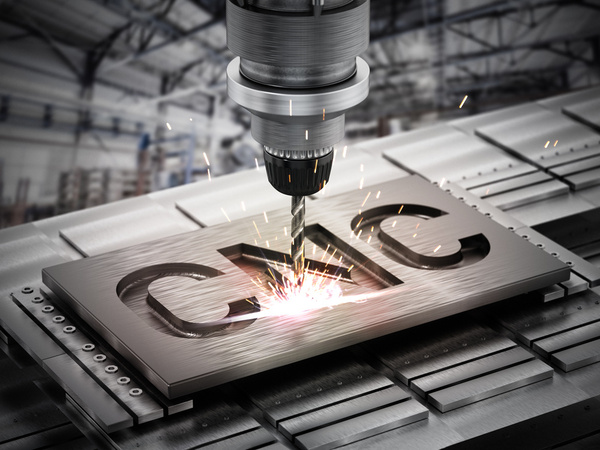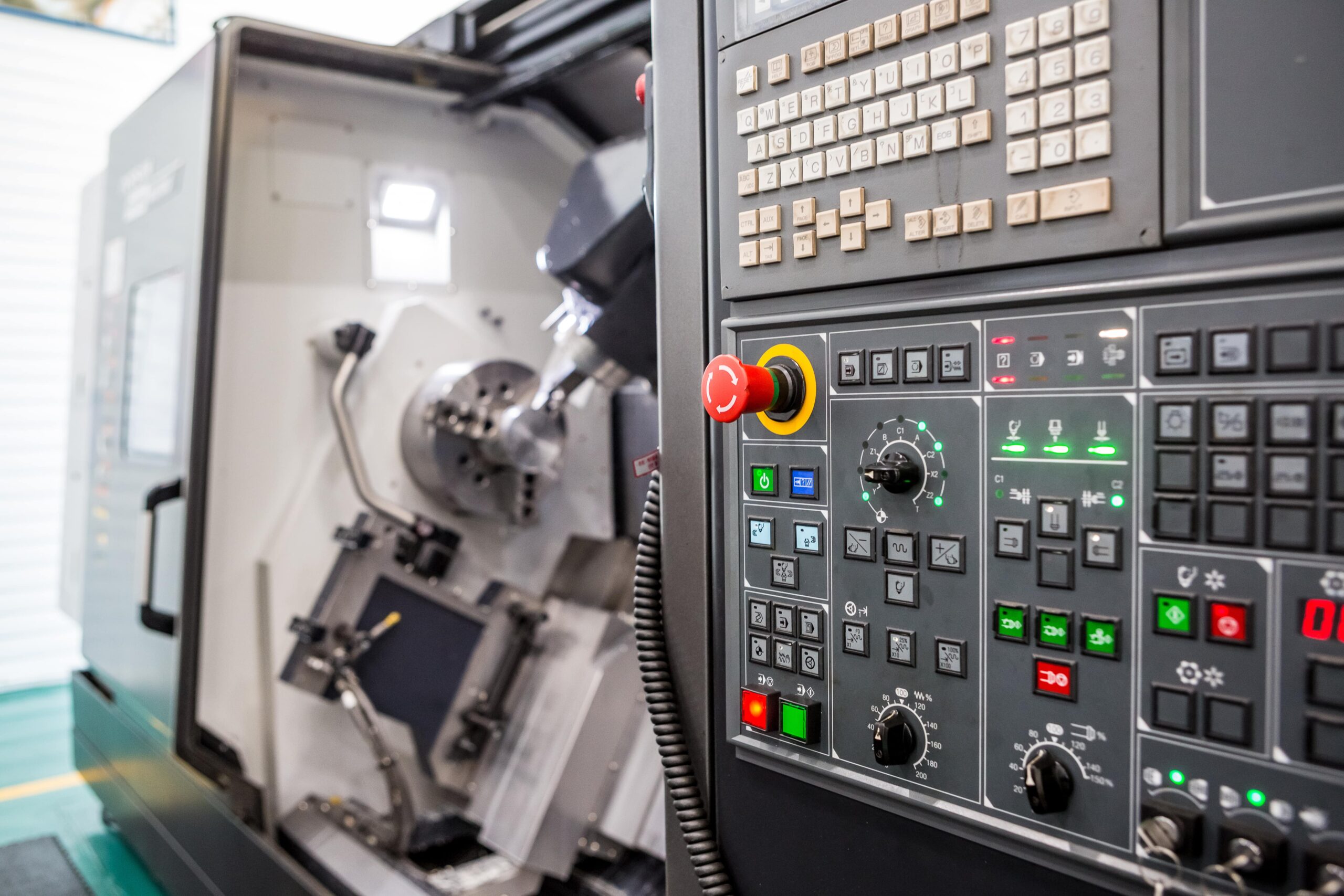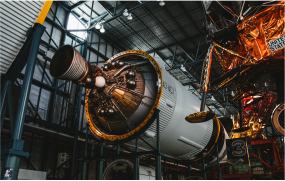CNC Milling
The milling machine is at the heart of any machine shop, and computerized numerical control (CNC) is the lifeblood of this equipment. During CNC milling, pre-programmed software dictates the movements of the production tools to yield complex parts faster and more affordably than traditional milling.
Colorado’s Advanced Precision Machining (APM) in Longmont offers an array of CNC milling services performed by highly skilled machinists utilizing the latest technology. Our manufacturing facility contains the finest vertical milling machines available on the market today.
Definition and Explanation of CNC Milling
CNC milling is a manufacturing process that involves the use of computer-controlled machines to remove material from a workpiece to yield a desired design. CNC stands for “computerized numerical control,” which refers to the use of software to guide the movement of the milling machine.
CNC milling is used in a wide range of industries, including aerospace, automotive, and medical. It offers several advantages over traditional milling, including more accuracy, consistency, and efficiency. Its ability to produce complex parts with tight tolerances and intricate geometries, makes CNC milling an essential tool for modern manufacturing.

Importance and Benefits of CNC Milling
CNC milling offers numerous advantages over traditional machining methods. Here are some of the most
significant benefits:
About APM’s CNC Milling Solutions

At Advanced Precision Machining (APM), we use the latest in precision manufacturing technology. Our facility runs what many consider to be the finest vertical milling machines on the market today: Hurco.
The VMX 50 and 42S are both highly accurate machines worthy of the largest and most demanding projects. These bed type mills offer up to 4-axis cutting precision and take advantage of Hurco’s powerful Ultimax control. They are specifically designed for speed in all applications. With an extraordinarily large work cube in a smaller package, APM mills with the VM20, VM10, and VM1.
These machines are designed to optimize the production process without sacrificing accuracy, time, or–most importantly–money. Rounding out APM’s milling solutions are the Hurco Hawk 40 and the ProtoTRAK A.G.E 2. Both more traditional knee-type mills, they operate in two dimensions and are ideal for making parts in small quantities, when programming more complex CNC machines is impractical.
Types of CNC Milling Machines
At APM, we offer a wide range of CNC milling services to meet the various needs of diverse clients. We do so using state-of-the-art milling machines, which are designed to produce high-quality parts with speed and efficiency.
Vertical Milling Machines
Most small and mid-sized CNC machine shops like APM handle the majority of their work utilizing vertical CNC milling machines (VMCs). Given their relative affordability and versatility, these are the go-to piece of precision machining equipment utilized on most shop floors.
The cutting-edge technology in VMCs employs a spindle in a vertical orientation, so it works with gravity to remove material from the top of a workpiece. VMCs possess 3-, 4-, or even 5-axis capability, allowing for a range of possibilities in shaping machined parts. Adding components such as pallet changers is a great way to increase efficiency, productivity, and profitability by shortening cycle and load times.
VMCs are generally more versatile than their horizontal counterparts and have relatively simple CNC controls to program. Perhaps the greatest advantage, however, regards costs. VMCs are far more affordable than horizontal milling machines. As with every piece of equipment, though, they do have their drawbacks. These include:
- Limited capacity for larger or heavier workpieces
- Limited ability to handle irregularly-shaped parts
- Limited access to the workpieces during certain operations



Horizontal Milling Machines
At APM, we’re always looking for ways to expand and improve our CNC machining capabilities. One option we are exploring is adding an advanced horizontal machining center (HMC) to our lineup.
According to the Association for Manufacturing Technology, the average cost of an HMC is $375,000, compared to just $115,000 for a VMC. The cost is arguably worth it, though, since HMCs have the potential to handle double the capacity of VMCs. The HMC spindle is configured in a horizontal orientation, allowing for uninterrupted production work. Additionally, a two-pallet workchanger can be loaded onto one side while CNC machining occurs on the other, improving efficiency further.
HMCs are designed with the cutting tool mounted horizontally, making them ideal for handling large and heavy workpieces. These machines are commonly used for roughing and finishing operations, including slotting, drilling, and profiling. They can also produce parts with complex geometries and are often used in industries such as automotive, aerospace, and heavy machinery.
The horizontal orientation of HMCs offers several benefits, including less cleanup time, longer tool life, and better finishes. This is because workpiece chips fall out of the way aided by gravity, resulting in a cleaner work environment. Furthermore, HMCs are built with a heavy design and more rigidity for high volume capacity. They can be configured with multiple axes, tombstones, additional vises, and other options to further maximize productivity.
Of course, like VMCs, HMCs have a few disadvantages. For example, they
- Have a fairly large footprint because of their size, so they take up considerable space in even the largest shops
- Are difficult to operate and maintain
- Require more setup time for tooling changes, which can stall productivity
Vertical Vs. Horizontal Milling Machines
While both types of milling machines have their advantages and disadvantages, choosing the best one ultimately comes down to the specific demands of the project at hand. For example, vertical milling machines are ideal for producing parts with flat or contoured surfaces and offer greater versatility and flexibility. Horizontal milling machines, on the other hand, are ideal for handling larger and heavier workpieces and are excellent for roughing and finishing operations.

CNC Milling Processes
Safety Precautions and Best Practices
Consider the following scene: An experienced employee accidentally leaves a hand tool inside a CNC milling machine. After reaching in to retrieve it, a co-worker unknowingly powers up the machine, resulting in serious bodily injury.
Thanks to modern safeguards, such a worst-case scenario is rare, but almost every kind of dangerous hazard can be found in a milling and machining environment. It’s a well-known fact that machine shops present many unique hazards distinct from those in other workplaces. This is why at APM, we’re committing to abide by all safety precautions.
The generalized information presented in this post is by no means new, but due to the increased demand for high-speed milling and machining services, our industry is experiencing an influx of new CNC machinists.
The bottom line is that even among more experienced workers, complacency can eventually set in. At APM, we have an extensive safety and occupational health program, including some very basic operator guidelines we’d like to share. Running a safe facility starts and ends with the health and well-being of all employees.
No matter the size of the operation, every machine shop has all kinds of equipment running, each with potential hazards. From a CNC machine operator perspective, our general safety guidelines focus on:


Eye Protection
Milling and turning machines produce metal chips, dust, and shavings known in the industry as swarf, which can cause eye injuries. In addition, mills, lathes and routers contain cutting tool assemblies made of hardened steel, which has the potential for breakage while rotating at very high speeds. Modern CNC machines are outfitted with guards and are fully enclosed, but accidents can still occur as chips and other material can escape. ANSI-approved eye protection such as impact protection safety glasses or goggles with side shields should be worn at all times, including over prescription eyewear.

Noise Protection
High intensity noise is an ever-present companion on the machine shop floor, with levels sometimes reaching 100 decibels or more. A good rule of thumb is if you can’t carry on a normal conversation without raising your voice, then sound is approaching unsafe levels. Prolonged or repeated exposure can result in noise-induced hearing loss, which is permanent. Therefore, OSHA-approved hearing protection such as earmuffs or soft, moldable ear plugs should always be worn.

Respiratory Protection
In addition to processing toxic or flammable materials, a precision manufacturing facility unfortunately produces a number of byproducts that, when inhaled, have potential health impacts. Grinding dust, machine tool coolants, lubricants, and certain heated metals all produce fine particles, fumes, and mist. When working without proper ventilation, such as fans and ducting, it is advisable to wear a respirator.
Machine Tool Safety
Because specific safety instructions vary depending on the machine, the following represents a basic list of the top 10 general guidelines we feel are inherent to working with any CNC machine. These were taken from the ILO Encyclopedia of Occupational Health & Safety. For specific machine information, refer to your operating manual.
- Be sure all operators are trained in all machine tool functions, including emergency shut-off procedures.
- Never operate a machine without doors closed and functioning locks.
- Keep all electrical panels and control cabinets secured and locked to limit access and accidents.
- Do not attempt to modify your equipment in any way or to use any equipment that has been modified by someone else.
- Never enter the machine enclosure, unless for maintenance or cleaning, and then only if the machine is entirely powered off.
- Never operate controls with your hand on or near the tool spindle.
- Always remain clear of the tool changer during power up, power down, and while operating.
- Always stop a machine before cleaning a part or taking measurements.
- Never lubricate a machine while it is in motion.
- Never remove chips, filings, or shavings with a bare hand to avoid cuts.
While it probably seems that shop floor safety can hinder productivity in a precision manufacturing setting, protecting workers from harm should be the single greatest priority. Following these rules and guidelines will mitigate serious injuries and accidents.


Automotive Industry
CNC milling is widely used in the automotive industry for the production of various car parts. These include engine components, chassis parts, steering components, and suspension parts. The high accuracy and precision of CNC milling machines make them ideal for producing complex geometries with tight tolerances. CNC milling also enables the production of parts with consistent quality, which is important for the automotive industry.

Aerospace Industry
The aerospace industry heavily relies on CNC milling for the production of parts used in aircraft and spacecraft. CNC milling machines are used to produce complex parts such as turbine blades, wing components, landing gear components, and engine parts. The use of CNC milling machines in the aerospace industry ensures high precision and accuracy, which is crucial for safety and reliability.

Medical Industry
CNC milling machines are used in the medical industry for the production of medical implants, prosthetics, and surgical instruments. These parts require high precision and accuracy to ensure they fit perfectly and function correctly. CNC milling machines enable the production of complex geometries with high accuracy, making them ideal for medical applications.

Energy Industry
The energy industry relies on CNC milling machines for the production of parts used in various energy production and distribution systems. These include turbines, generators, and transformers. CNC milling machines are also used in the production of wind turbine components. The high precision and accuracy of CNC milling machines ensure these parts are manufactured to the required specifications, which is critical for the energy industry.

Art and Sculpture
These machines are increasingly being used in the art and sculpture industry. Artists and sculptors use CNC milling machines to create complex and intricate designs that would be difficult or impossible to produce using traditional methods. CNC milling machines enable artists and sculptors to create highly detailed and precise works of art with ease.

Prototyping and Model-Making
Engineers and designers use CNC milling machines to produce prototypes and models of products they are developing. This enables them to test and refine their designs before moving to full-scale production methods. CNC milling machines are ideal for prototyping and model-making because they can produce highly accurate and precise parts quickly and easily.

Jewelry and Design
Jewelry designers use CNC milling machines to produce highly detailed accessories. These machines enable designers to create intricate patterns that would be difficult or impossible to produce using traditional methods. CNC milling machines are also used in the fashion industry to produce delicate parts for products like watches and eyewear.
Overview of Services Offered

Custom Milling Services
At APM, we understand that every project is unique. That’s why we offer custom milling services to meet your specific needs. Whether you require a certain material or finish, we can provide a tailored solution that fits your precise requirements.
CAD/CAM Design Services
Our experienced design team will ensure your ideas come to life with the help of our CAD/CAM design capabilities. We use 3D modeling to create detailed and accurate designs. Then, our CNC machines are programmed to bring them to life. We are here to make sure your projects are delivered as you envisioned them.
Training and Consulting
We believe that knowledge is power, which is why we offer training and consulting services for our clients. Whether you need help optimizing your milling processes, troubleshooting a problem, or learning about the latest industry trends and technologies, our team is here to help.
If you’re interested in our CNC milling services, contact us today to request a quote.
Wrapping Up
CNC milling is a highly precise and efficient manufacturing process that uses computer-controlled machines to create parts and components. CNC milling offers several benefits, including:
- High precision and accuracy: CNC milling machines are capable of producing parts with high accuracy and consistency, ensuring that the finished products meet the exact specifications required.
- Increased efficiency: CNC milling machines can produce parts quickly and with minimal waste, reducing production time and costs.
- Versatility: CNC milling machines can produce parts in a wide range of sizes, shapes, and materials, making them ideal for a variety of industries and applications.
- Flexibility: CNC milling machines can be programmed to produce a wide range of parts and components, allowing for quick and easy adjustments to production as needed.
Overall, CNC milling is an essential manufacturing process that offers numerous benefits and advantages over traditional manufacturing methods. Want to try our services? APM’s certified machinists are happy to discuss any milling project with you. Call us today at 303-776-1910 to get started.
To learn more about CNC Milling, visit our machine shop blog. Here, you’ll find all kinds of resources that dive deep into machining technology, industry news, trends, and so much more!

Have Questions?
No testimonial found
Frequently Asked Questions
- What is CNC milling?
- What happens during the CNC milling process?
- What are the biggest benefits of CNC milling?
- How do vertical and horizontal milling machines differ?
- How do machinists protect themselves from occupational hazards?
- Which industries rely on CNC milling?
CNC milling is a computerized process for manufacturing complex parts with tight tolerances. CNC stands for “computerized numerical control.” This refers to the powerful software that guides the movement of the milling machine so it can create highly precise and intricate geometries.
CNC milling starts with designing the part to be produced. This is done using computer-aided design software, which generates a 3D model. The next step is programming the machine and then loading the raw material. Once everything is set up, the actual milling can begin. During this step, the cutting tool moves along the X, Y, and Z axes to sculpt the material. After milling is complete, the final step is conducting a quality control check. Depending on the application for the piece, additional finishing processes like deburring or sandblasting may be necessary.
CNC milling has several advantages over traditional machining methods. These include more precision, better accuracy, total consistency, faster production, maximum flexibility, and enhanced design capability.
Vertical milling machines (VMCs) employ a spindle in a vertical orientation and utilize the power of gravity to remove material from the top of the piece being worked on. Horizontal milling machines (HMCs), on the other hand, use a spindle that’s configured in a horizontal orientation, which allows for uninterrupted production. Most small to mid-sized CNC machine shops, including APM, use VMCs for the majority of their milling operations.
CNC machine operators are exposed to a number of occupational hazards, including flying shards that can cause eye injuries, loud noises that can cause hearing loss, and airborne byproducts that can harm the lungs. For this reason, they must always wear eye protection, earmuffs, and a respirator.
Parts produced by CNC milling have a number of applications across a wide range of industries. Examples include the automotive, aerospace, medical, and energy industries.





